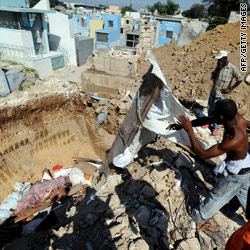
I have spent the last several days glued to the television or satellite radio. The earthquake in Haiti is frightening, maddening, and above all the definition of human crises. The first announcement of the earthquake in Port-au-Prince occurred while I was on the treadmill. That night after several failed attempts at sleep, I turned over and spent the remainder of the very early morning watching coverage.
Each body found, each child abandoned, each cry for help took something out of me.
I was a small child when John Kennedy was killed. Sitting in my godmother’s store, we listened on radio to the coverage. I was sitting in the kitchen watching CBS coverage of the events and witnessed Jack Ruby shoot JFK’s accused killer. A few years later, during dinner I watched Robert Kennedy shot, turmoil in the hotel, and the eventual take down of a killer. It felt a heartbeat away Martin Luther King was killed by a lone gunman. From that point, Vietnam death tally every evening on the national news, the Six Day War, countless Middle East wars, Northern Ireland were events demonstrating the worse aspects of human nature. Religious School taught lessons of social justice and acts of loving-kindness. We had a prayer book written for middle and high school students – traditional readings were replaced with folksongs of the sixties, Beatles verses, and quotes from JFK, Robert Kennedy, MLK, and civil rights. The yin and yang of life – reality, theology, conflict, promises of hope, were instilled in daily life.
11 September. Our generation need only say 9-11 and America’s first continental home front attack since our earliest period of nationhood is at the forefront of your mind. Kuwait wasn’t a war but for several weeks, 24/7 coverage from both sides of the battle was in our faces thanks to 24/7/365 news broadcasts. Radio transmissions had given way to newsreel coverage in the theater, evolving into taped footage reported in the evening and fodder for family discussion, ultimately was transformed into live reality. It was the reality that gave way to fear, frustration, and the need to do something. During the intervening years, I experienced bomb threats locally resulting from Middle East politics. Friends left the States to work in Israel or join the Army; again fear came from firsthand involvement in the fighting.
Technology took the place of friendship making each child, adult, family part of my community. The technology drawing me into the battle and feeling despair and pain is the same technology enabling the battle. Technology driven story telling brought the horror of New Orleans hurricanes and flooding into my laptop, car, home, and gym. A failed bomb attempt was reported on my Blackberry, television, car satellite radio, and email; all the day before one of my sons was to board a flight to return to Minneapolis.
My mom and dad’s generation experienced two world wars and the Korean skirmish. War was death and killing coupled with chocolate bars and George M. Cohan musicals. Friends became soldiers but the real story of the war was rarely shared. The Holocaust was very real because we knew survivors, liberators, and immigrants. Miep Geiss was not only a name in The Diary of Anne Frank, she was someone we met and chatted with.
Baby Boomers experienced reality real time. The casualties in New York, New Orleans, Haiti became personal friends and family through story telling of the crises. The notion of a global community was no longer a theory. Technology destroyed the Berlin Wall, the Wall of China, the 38th Parallel, large expanses of ocean.
My children and nieces assume the connectivity of the world and its events. They are a generation of instant communication and video games, the immediacy of cell phones and the connectivity stemming from social networks. There are no longer newsreals to wait for. I just watched a reported slide a microphone into the ruble and speak with a child trapped by the Haitian earthquake. All the while, the child’s uncle in the United States was on Skype learning the child’s fate.
I am depressed. My heart breaks with each new body found. The earthquake’s losses were as close as my neighbor. During the Kuwait battles psychologists found a public depression and malaise occurring as a result of 24/7 coverage. It is happening again. I desperately want to do something to help these people and donations are insufficient. Perhaps due to the social action and acts of lovingkindness lessons from years before or the HD satellite coverage of the earthquake; the global community is tugging at my heart.
Some believe the global community and 24/7 story telling is creating a generation of callused hearts. Understanding our global community’s events as crises points with systemic causes helps teach how to create positive change. One of my high school teachers and mentor often said that history is cyclical; if you understand the events of the cycle you can be prepared to better manage the next cycle. There are management lessons, theological conversations, history, and strategy discussions that are, can, and should be conducted.
My sadness is real and the pain watching these children fighting infection makes me feel wary. This is not the time for learning’s from the events. I just want the child pulled from the ruble to find a warm home, nourishment, and someone to tuck them tomorrow night. Technology is not a solution – it’s a tactic. The heart is not a mechanical instrument – it’s the price of admission for our global community.
Leave a Reply